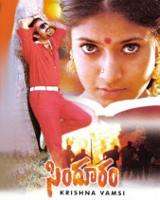Sindhooram
| Sindhooram | |
|---|---|
 film poster | |
| Directed by | Krishna Vamsi |
| Produced by | Krisha Vamsi |
| Written by |
|
| Screenplay by | Krishna Vamsi |
| Story by | Krishna Vamsi** |
| Starring |
Ravi Teja Sanghavi Brahmaji Bhanu Chander |
| Music by | Sri Kommineni |
| Cinematography | S. K. A. Bhupathi |
| Edited by | Shankar |
Release date |
|
Running time | 144 minutes |
| Country | India |
| Language | Telugu |
Sindhooram (Telugu: సింధూరం) is a 1997 Telugu, thriller film, written and directed by Krishna Vamsi. The film features Ravi Teja, Sanghavi and Brahmaji in lead roles. The film dealt with the intricacies of Naxalism in Andhra Pradesh.[1][2] [3] The film and the soundtrack has received positive reviews upon release, and gathered cult following.[1][2] The film has garnered the National Film Award for Best Feature Film in Telugu - "For the film's sincere effort at analysing, the problem of corruption which leads to disillusionment among the young and perpetuates violence within a society",[4][5] and the Nandi Award for Best Feature Film (Silver). The film was screened at the International Film Festival of India.[4][5] Sindhooram was a box-office disappointment.[1][2] [3][6]
Plot
The movie begins with a cadre of police constables on their way home from election duty. As they discuss their lives, their van is blown up by a gang of Naxals.
Bulliraju (Brahmaji) is in training to become a police officer. He is hot blooded and has a strong sense of justice. Buliraju is from a small village close to the Godavari river.
Chanti (Ravi Teja), Bairagi, Satipandu and others are wayward youth who reside in the same village. They spend their time playing cards, drinking and teasing girls. They are all friends with Buliraju. Few of them are also naxals and pass information of the ongoings of the village to Naxalites who live in the nearby forest. The Naxals use this information to fight injustice.
Baby (Sanghavi) and Lakshmi are girls in the same village. Baby is in love with Buliraju and Lakshmi is in love with Chanti. Also in the village are various other characters such as landlords, policemen, doctors, farmers and day laborers.
Buliraju returns in the middle of his police training to find that the local policemen act more like the henchmen of the rich rather than defenders of the people and justice. When Satipandu is suspected of being a closet Naxal and is picked up by the police, Buliraju too is picked up too as he tries to defend his friend. The SI shoots and kills Satipandu and later in an altercation, Buliraju accidentally shoots the SI.Buliraju is thus branded as a Naxal and eventually becomes the leader of the group,despite having no interest in Communism/Maoism or Vigilantism. Buliraju brings a different approach to naxalism, as he is more focused on delivering justice to the people rather than spread a communist/Maoist ideology. In a way he turns the Naxal gang into a vigilante gang. To the police however, they are all the same, as they have taken the law into their own hands.
He becomes a symbol of law and order in the 30 surrounding villages and is seen as a form of alternate government.
Buliraju's training officer (Bhanu Chander) is designated the task of wiping Naxalism from the area. He sees Buliraju as an outlaw who joined police training to learn their secrets. He vows to bring Buliraju to justice.
One day, Bairagi is betrayed by an illegal arms dealer and is captured. Buliraju kidnaps the local minister (chalapati) in an effort to get Bairagi back. Buliraju's gang is already decimated by various forces such as poisoned water, police encounters, weather and the elements of the forest. They fight on despite the fact that they are running out of ammunition. The police is on their trail for the kidnapping of the minister. Eventually the police catches up to them and most of the die with heavy casualties on both sides.
The overall message of the movie is that when people have nothing to lose, they will not shy away from taking the law into their own hands.When the common man is denied justice from official channels, he will seek justice from whoever will give it to him. Justice is as important to the sustenance of a society as food and water.When justice becomes a luxury, society turns to chaos and death becomes a way of life.When a government doesn't provide the kind of justice that society needs, society will try to snatch for it as easily as a drowning man will grasp for breath.
Cast
- Ravi Teja as Chanti
- Brahmaji as Buliraju
- Sanghavi as Baby
- Narasimha Raju as Gopal Reddy, ex-Naxalite leader
- Bhanu Chander as Training Officer
- Chalapati Rao as Minister
- Paruchuri Venkateswara Rao as Bairagi
- Pruthviraj Balireddy as Naxalite
- Sivaji Raja as Police Constable
- Surya as Chandra, a Naxalite
- Annapoorna as Buliraju's mother
- Ahuti Prasad
- Bandla Ganesh
Awards
- National Film Award for Best Feature Film in Telugu - 1998
- Nandi Award for Best Feature Film (Silver) - 1998
References
- 1 2 3 "Rediff On The Net, Movies: 'I want to be a free bird'". www.rediff.com.
- 1 2 3 "Chat with Telugu director Krishna Vamsi".
- 1 2 http://www.ragalahari.com/hitsdetail.asp?mvname=Sindhooram
- 1 2 "45th National Film Awards". International Film Festival of India. Archived from the original on 5 May 2014. Retrieved 11 March 2012.
- 1 2 "45th National Film Awards (PDF)" (PDF). Directorate of Film Festivals. Retrieved 11 March 2012.
- ↑ "Join me on Raaga". Raaga.com.
External links
- Sindhooram on IMDb